October 2025
The hydrogen fuel cell vehicle market size is projected to reach USD 164.54 billion by 2034, growing from USD 3.59 billion in 2025, at a CAGR of 52.94% during the forecast period from 2025 to 2034.
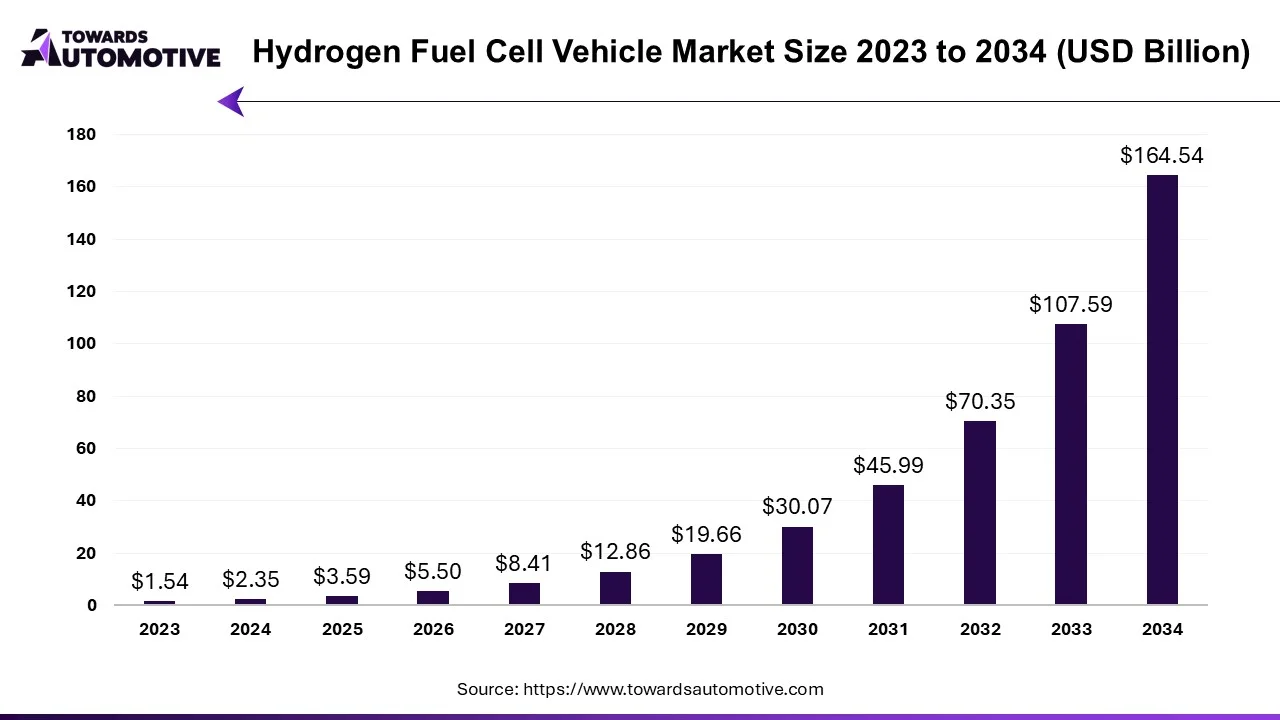
The hydrogen fuel cell vehicle market is a prominent branch of the automotive industry. This industry deals in manufacturing and distribution of vehicles that use hydrogen gas to power electric motors. There are several types of vehicles developed in this industry comprising of buses, LCVs, passenger cars and trucks. It has different components including air compressors, fuel processors, fuel stacks, humidifiers, power conditioners and some others. These vehicles are differentiated based on various operating miles such as 0-250 miles, 251-500 miles and above 500 miles. The rising awareness to reduce GHGs emission in the environment has contributed to the industrial development. This market is expected to rise significantly with the growth of the automotive technology sector across the world.
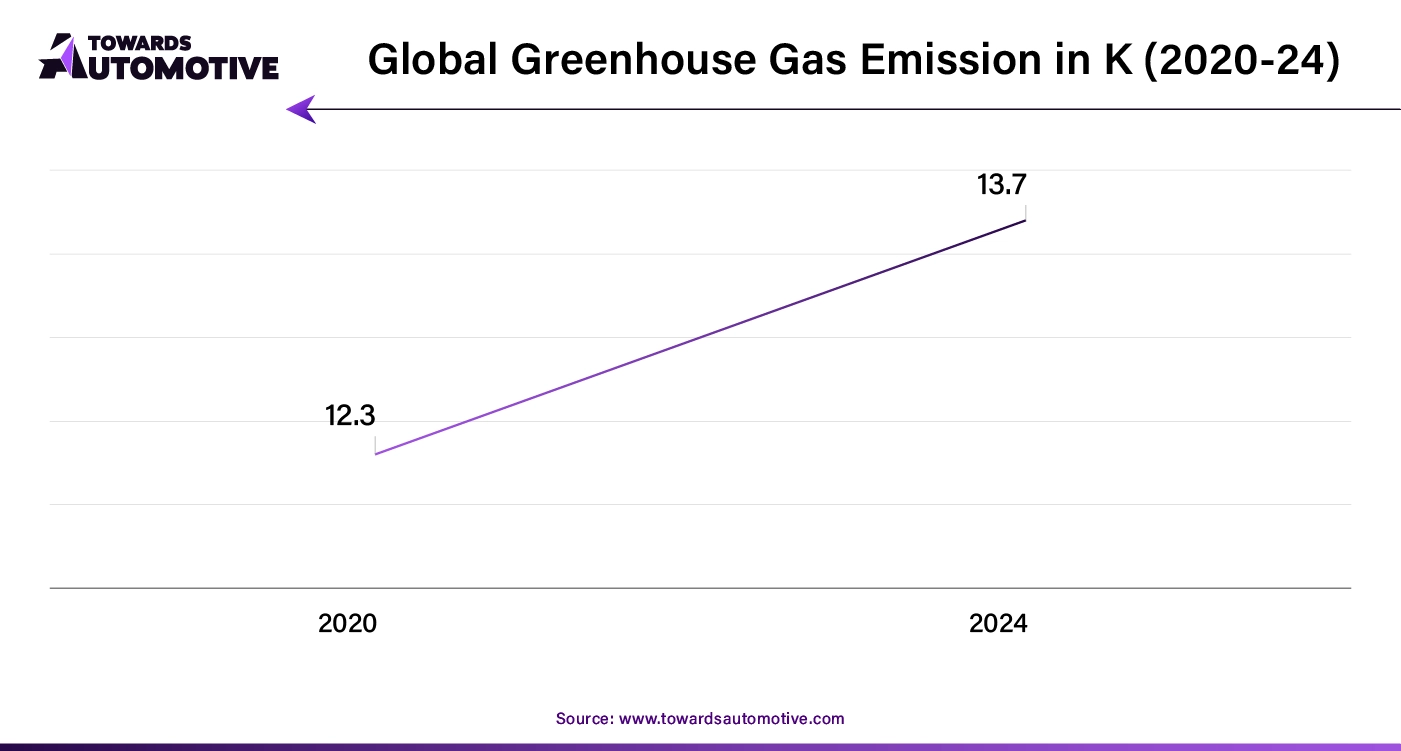
In June 2024, Patrick McIntyre, the lead of the Performance Manufacturing Center (PMC) of Honda made an announcement stating that, “The Performance Manufacturing Center was conceived as a small volume manufacturing facility with a focus on craftsmanship, and I’m proud of how our production technicians leveraged their experience building the Acura NSX to take on the challenge of making this all-new Honda CR-V e:FCEV, Producing a zero-emission fuel cell electric vehicle is one more step toward Honda’s global goal of achieving carbon neutrality for our products and operations.”
The global automotive fuel cell system market is predicted to expand from USD 22.29 billion in 2025 to USD 111.45 billion by 2034, growing at a CAGR of 19.58% during the forecast period from 2025 to 2034.
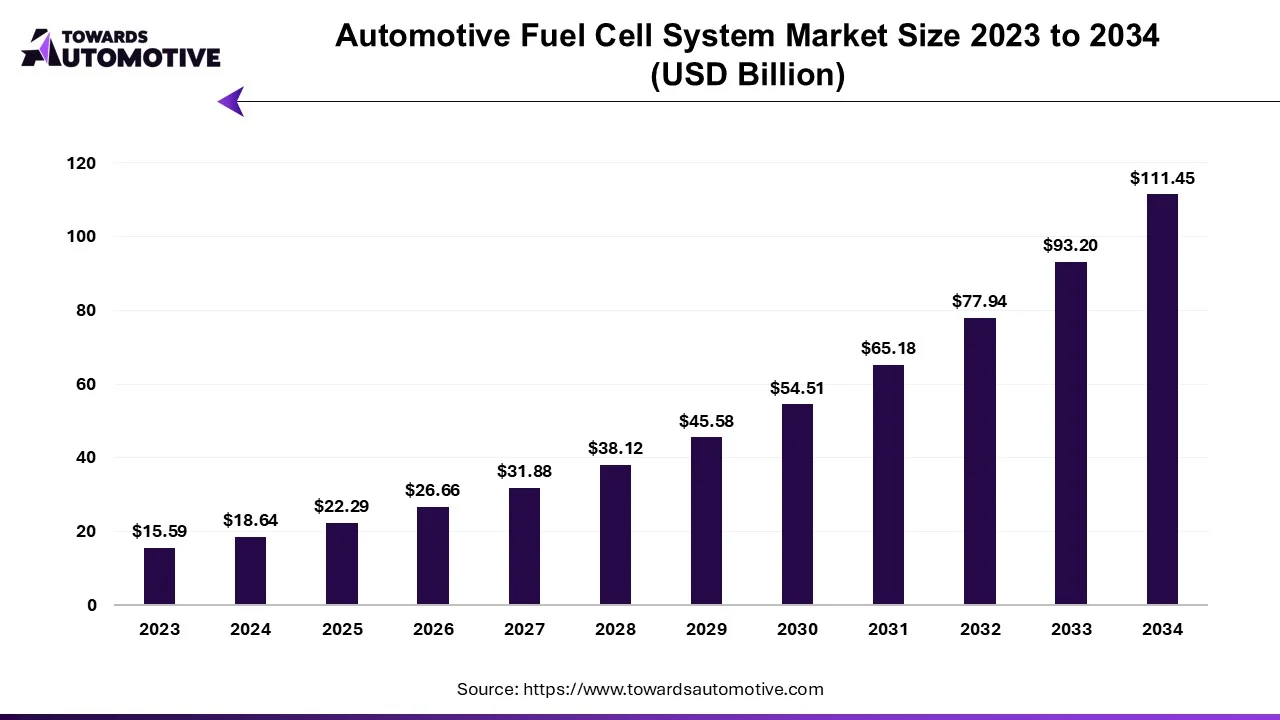
The automotive fuel cell system is a clean energy solution revolutionizing the transportation sector by offering an efficient and sustainable alternative to traditional internal combustion engines. It operates by converting hydrogen gas into electricity through an electrochemical process, producing only water and heat as byproducts. This makes fuel cell vehicles (FCVs) environmentally friendly, as they generate zero emissions while delivering long driving ranges and quick refueling times compared to battery electric vehicles (BEVs). The system typically consists of components such as a fuel cell stack, hydrogen storage tanks, and power electronics that work in synergy to provide seamless energy to the vehicle's motor. Increasing concerns over greenhouse gas emissions, rising fossil fuel prices, and global initiatives to curb air pollution have accelerated the adoption of automotive fuel cell technology.
Moreover, advancements in hydrogen production, storage, and refueling infrastructure are addressing key challenges in scaling up this technology. Automakers, including Toyota, Hyundai, and Honda, are spearheading the development of FCVs, driving innovation and market growth. With its potential to combine clean energy with high performance, the automotive fuel cell system is poised to play a pivotal role in achieving a carbon-neutral future in the global automotive industry.
The fuel cell electric vehicle market is forecast to grow at a CAGR of 21.40%, from USD 3.09 billion in 2025 to USD 17.73 billion by 2034, over the forecast period from 2025 to 2034.
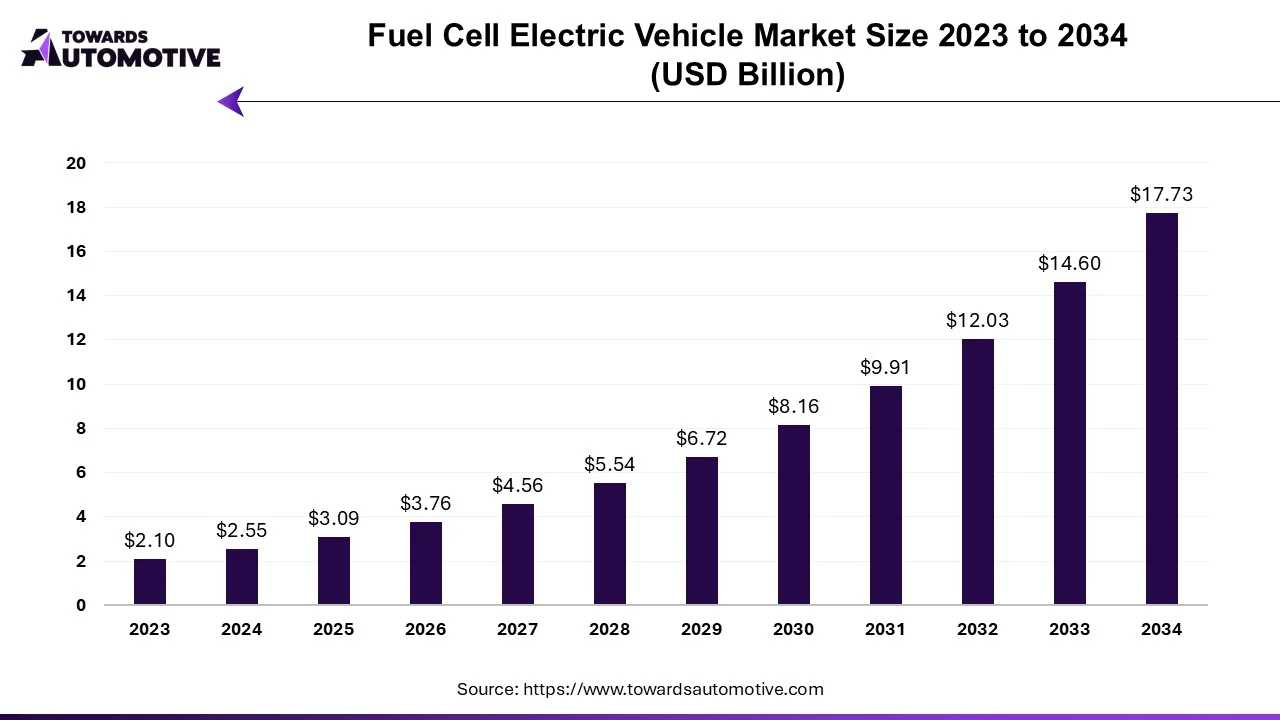
The challenges posed by climate change; renewable energy has emerged as a critical component of the global energy landscape. Governments worldwide are enacting favorable regulations, offering subsidies, and providing tax incentives to incentivize entrepreneurs to engage in renewable energy production. This concerted effort aims to stimulate investment in sustainable energy sources and drive economic growth.
Moreover, pollution reduction initiatives and stringent government regulations are pushing companies to curb carbon emissions and enhance vehicle fuel efficiency. As a result, manufacturers are increasingly turning their focus towards developing vehicles powered by Fuel Cell Electric Vehicles (FCEVs). These vehicles utilize hydrogen fuel cells to produce electricity, emitting only water vapor as a byproduct, thus offering a clean and environmentally friendly transportation solution.
Amidst this shift towards cleaner energy, electric vehicle charging infrastructure has become a focal point for major investors. Collaborating with governments, significant investments are being directed towards the establishment of charging stations, particularly hydrogen fuel cell stations, to support the growing fleet of FCEVs. Notably, initiatives such as California's $115 million investment plan to construct 111 new hydrogen fuel cell stations by 2027 underscore the commitment towards expanding the infrastructure for FCEVs.
Additionally, partnerships between companies like GreenCore and Loop Energy further demonstrate the collective efforts to advance hydrogen-powered transportation. By collaborating on the design and implementation of hydrogen-powered fast charging stations, these entities aim to alleviate concerns regarding charging infrastructure and enhance the accessibility of electric cars, thereby promoting their widespread adoption.
Overall, the convergence of government support, environmental imperatives, and private sector investments is driving momentum towards renewable energy adoption, particularly in the realm of hydrogen-powered transportation. These initiatives not only contribute to mitigating climate change but also foster economic growth and innovation in the renewable energy sector.
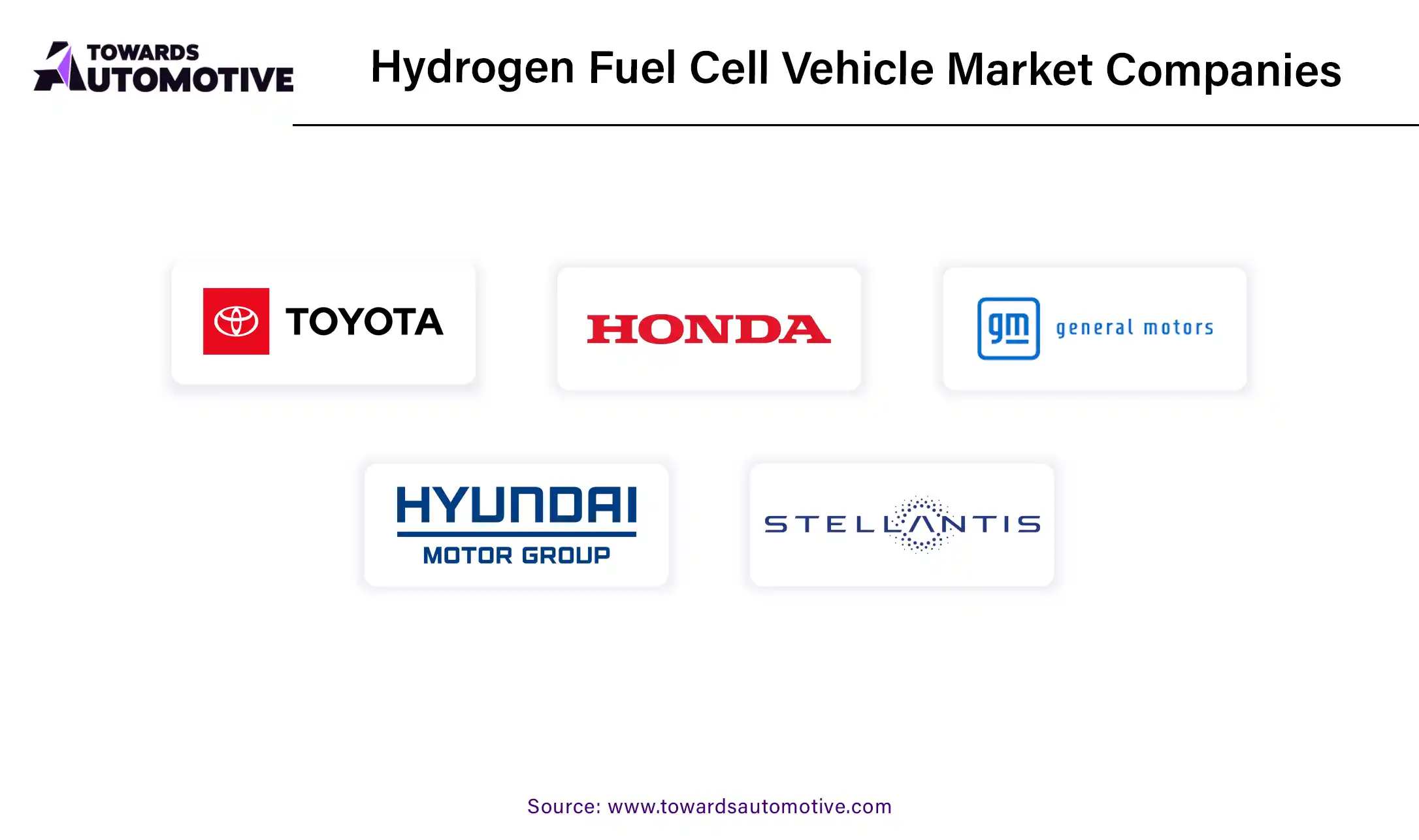
The hydrogen fuel cell vehicle market is a developing industry with the presence of a few dominant players. Some of the prominent players in this industry consists of Toyota Motor Corporation (Japan), Honda (Japan), General Motors (US), Hyundai Group (South Korea), Stellantis and some others. These companies are constantly engaged in research and development of hydrogen-powered vehicles and adopting several strategies for maintaining their dominant position in this industry.
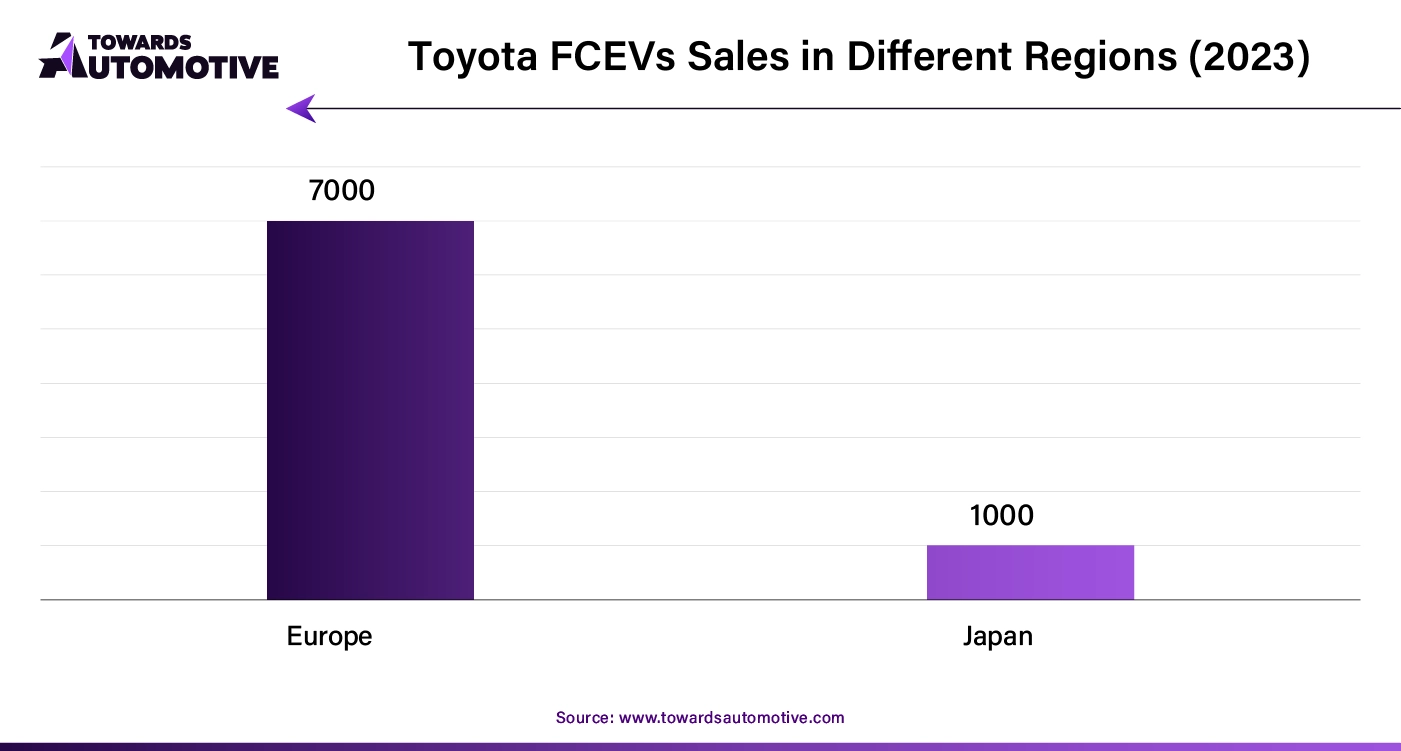
By Vehicle Type
By Technology
By Region
October 2025
October 2025
October 2025
October 2025
We offer automotive expertise for market projections and customizable research, adaptable to diverse strategic approaches.
Contact Us